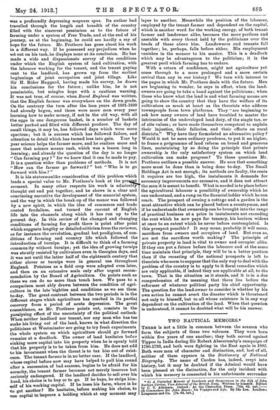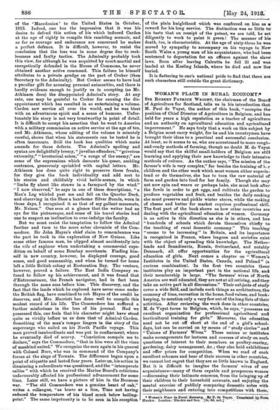TWO NAUTICAL MEMOIRS.* THERE is not a little in common
between the seamen who form the subjects of these two volumes. They were born within five years of one another; they both served against Tippoo in India during Sir Robert Abercromby's campaign of 1790-1793, and both were fighting in the East again in 1802. Both were men of character and distinction, and, last of all, neither of them appears in the Dictionary of National Biography. The name of Carden has, indeed, crept into history, but it may be doubted if the Admiral would have been pleased at the distinction, for the only incident with which his memory is connected is his unfortunate surrender
• (1) A Curtailed Memoir of Incidents and Occurrences in the Lifs of John
1
Sermon Carden, Vice-Admiral of the British Navy. Written Bry himself. Edited by C. T. Atkinson. Oxford : At the Clarendon Press. 6d. net.]—. (2) Commodore Sir John Hayes i his Voyages and Life. By da Lee. London s Longman and Co. [7s. 6d. net.]
of the 'Macedonian' to the United States in October, 1813. Indeed, one has the impression that it was his desire to defend this action of his which induced Carden at the age of eighty to compile this rambling memoir, and as far as courage and endurance are concerned he makes a perfect defence. It is difficult, however, to resist the conclusion that the loss was in some degree due to reck- lessness and faulty tactics. The Admiralty probably took this view, for although he was acquitted by court-martial and energetically defended in the House of Commons, he never obtained another active command. This failure be himself attributes to a private grudge on the part of Croker (then Secretary to the Admiralty). But Croker seems to have had a peculiar gift for arousing personal animosities, and there is hardly evidence enough to justify us in accepting (as Mr. Atkinson does) the disappointed Admiral's story. At any rate, one may be grateful to Croker for causing the dis- appointment which has resulted in so entertaining a volume. Carden saw service all over the world, and he was blest with an adventurous spirit and a sense of humour. Unfor- tunately his story is not very trustworthy in point of detail. It is difficult to accept his assertion that he went to America with a military commission on active service at the age of ten, and Mr. Atkinson, whose editing of the volume is minutely careful, shows that when his statements can be tested he is often inaccurate. Still the book has qualities which make amends for these defects. The Admiral's spelling and syntax are delightfully breezy, " juveline offenders," "griveious extremity," " heretecical seism," " a rouge of the enemy," are some of the expressions which decorate his queer, ambling sentences, generously sprinkled with capital letters. Mr. Atkinson has done quite right to preserve these freaks, for they give the book individuality and add zest to his stories and childishly vivid battle-scenes, in which " limbs fly about like straws in a farmyard by the wind." "I now observed," he says in one of these descriptions. "a Man's Leg whirled past me and fell on the Quarter Deck, and observing in the Shoe a handsome Silver Bucele, worn in those days, I recognized it as that of my gallant messmate, Mr. Nelson." One sees at a glance that the writer had an eye for the picturesque, and some of his travel stories lead one to suspect an inclination to over-indulge the faculty.
But we must resist the temptation to follow the Admiral further and turn to the more sober chronicle of the Com- modore. Sir John Hayes's chief claim to remembrance was the part he took in the exploration of New Guinea. Like some other famous men, he slipped almost accidentally into the role of explorer when undertaking a commercial expe- dition on behalf of some Bombay merchants. Finding him- self in new country, however, he displayed courage, good sense, and good seamanship, and when he turned for home left a little British colony at Restoration Bay. The venture, however, proved a failure. The East India Company re- fused to follow up his achievement, and it was found that d'Entrecasteaux, the French navigator, had in fact been through the same seas before him. This discovery, and the fact that the lands which he explored have never come under the British flag, have combined to rob Hayes of the credit he deserves, and Mrs. Marriott has done well to compile this modest record of his life. The Commodore has suffered a further misfortune in the loss of his journal. Had we possessed this, one feels that his character might have stood quite as vividly before us asr does that of Admiral Carden. Something of the man's temper lingers in the story of the supercargo who sailed on his North Pacific voyage. This man proved insubordinate and was put in confinement, where he eventually died of scurvy. "Conviction compels me to declare," says the Commodore, "that in him were all the vices of mankind united." We recognize the man again in his quarrel with Colonel Burr, who was in command of the Company's forces at the siege of Ternate. The difference began upon a point of etiquette and lasted four years. Later on, his action in dismissing a subordinate was questioned, and the "intemperate sallies " with which he received the Marine Board's criticisms unfavourably affected his professional advancement for some time. Later still, we have a picture of him in the Burmese war. "The old Commodore was a genuine heart of oak," writes a colleague, " as brave as a lion, Time not having reduced the temperature of his blood much below boiling- point." The same impetuosity is to be seen in his reception of the plain knighthood which was conferred on him as si reward for his long service. The distinction was so little to; his taste that on receipt of the patent, we are told, he set diligently to work to paint it green! The manner of his death, too, is characteristic. At the age of sixty-three he was moved by sympathy to accompany on his voyage to New South Wales a young man of his acquaintance, who bad been sentenced to deportation for an offence against the slave laws. Soon after leaving Calcutta he fell ill and was landed at the Keeling Islands, where he died and now lies buried.
It is flattering to one's national pride to find that there are such characters still outside the great dictionary.











































 Previous page
Previous page